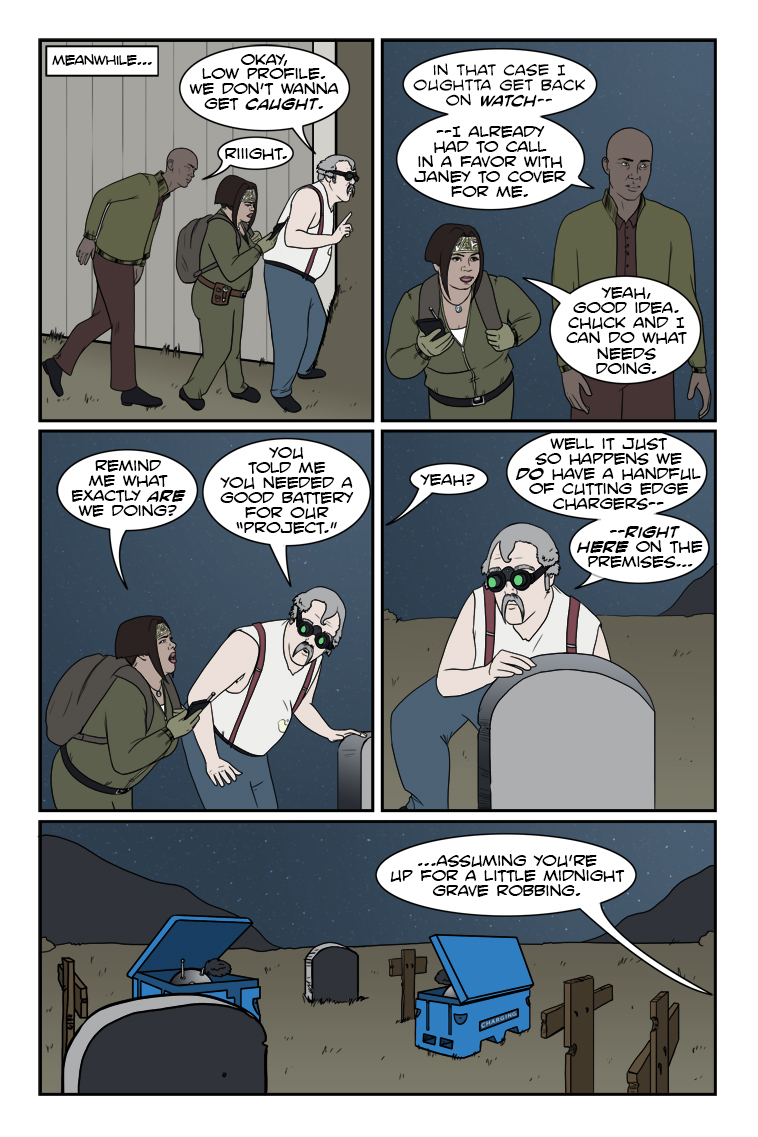Cart
Product categories
Support Us!
If you like what I do please support us on Ko-fi or Patreon.
Follow Us!
Join Our Newsletter!
Vote For Us!
Login
Polls
Events
-
Pasadena Comic Con
Dates: May 24
Location: Pasadena Convention Center, 300 E Green St, Pasadena, CA 91101, USA ( MAP)Details:We will be at the Pasadena Comic Con on January 26th. See some of you there for this one day event!
Purchase tickets online at here: https://www.tixr.com/groups/pcc/events/pasadenacomiccon-pasadena-comic-con-2025-115248
-
San Diego Comic Con: SP-N7
Dates: Jul 23 - 27
Location: San Diego Convention Center, 111 Harbor Dr, San Diego, CA 92101, USA ( MAP)Details:Clint & Dawn Wolf will be at San Diego Comic Con, as Lab Reject Studios. We will be at booth N7 in Small Press.









6 thoughts on “541 – Graverobbers”
Crazyman
“Oh, *that* kind of grave robbing? Lead on, Chuck!” 😈
Dr. Norman (not a real doctor)
What? I say “What”?
Keith
Heh, this is going to be fun. Tradition says you need to drink at least one bottle of MD 20/20 before going to the graveyard.
Honzinator
At first I was thinking of something like a potato battery … nope!
Scarsdale
If you take a dead “D” cell battery, take out the carbon rod from the center, cut a strip of galvanized sheet metal about an inch (2.7 centimeters), take a small jar for canning, suspend the rod in the center and the strip on the side, pour in drain cleaner, you’ll get 1.2 to 1.4 volts DC. 10 of those connected to an inverter will give you 120 VAC at 0.5 amps. Do NOT keep them in the same area you live in however, the fumes will burn your lungs. Just something I learned in chem class in high school. You’d have to top-up the jars every few days, however. Any type of acid will work, even salt water. I think the teacher was a survivalist…
nbaldbiz
Scheffler, Hovland and Conners Share the Lead at P.G.A. Championship
Jordan Spieth, who needs a victory at Oak Hill to complete the career Grand Slam, and Justin Thomas, who won last year’s tournament, just made the cut at five over.
Give this article
Latest Comics
#443. 425 – Scowls And Smiles
53 Aug 21, 2019
#442. 424 – Oath And Displeasure
54 Aug 14, 2019
#441. 423 – Passing Judgment
49 Jul 31, 2019
#440. 422 – Mort Circuit
51 Jul 10, 2019
#439. 421 – Authentic Personnel Only
51 Jul 03, 2019
#438. 420 – Licensed To Shill
56 Jun 26, 2019
#437. EPISODE EIGHTEEN
64 Jun 24, 2019
#436. 419 – The Doctor Is In (END OF EPISODE 17)
52 Jun 05, 2019
#435. 418 – Making Huachucas Cry
48 May 29, 2019
#434. 417 – Need Aid? Grenade!
51 May 22, 2019
#433. 416 – Secs And Violence
45 May 15, 2019
#432. 415 – Thudding Optimism
51 May 08, 2019
#431. 414 – Gun Control
48 May 01, 2019
#430. 413 – AK O.K.
49 Apr 24, 2019
#429. 412 – Apology Deflected
48 Apr 17, 2019
#428. 411 – Nope A Dope
49 Apr 10, 2019
#427. 410 – All Downhill From Here
50 Mar 20, 2019
#426. 409 – And Don’t Call Her Shirley
50 Mar 13, 2019
#425. 408 – Watching The Huachers
51 Mar 06, 2019
#424. 407 – Talk To The Ranch Hand
51 Feb 27, 2019
Latest Chapters
Episode 22
Episode 21
Episode 20
Episode 19
Episode 18
Episode 17
541 – Graverobbers
WonderCon 2025 is coming soon, so the next comic is planned for April 9th.
In the meantime, relevant previousness for this week's page:
https://www.zombieranchcomic.com/comic/223-surrounded-by-film-end-of-episode-9/
https://www.zombieranchcomic.com/comic/483-solar-systems/
The great escape…
Calendar
BlueSky Latest Posts
Writer’s Blog Archives